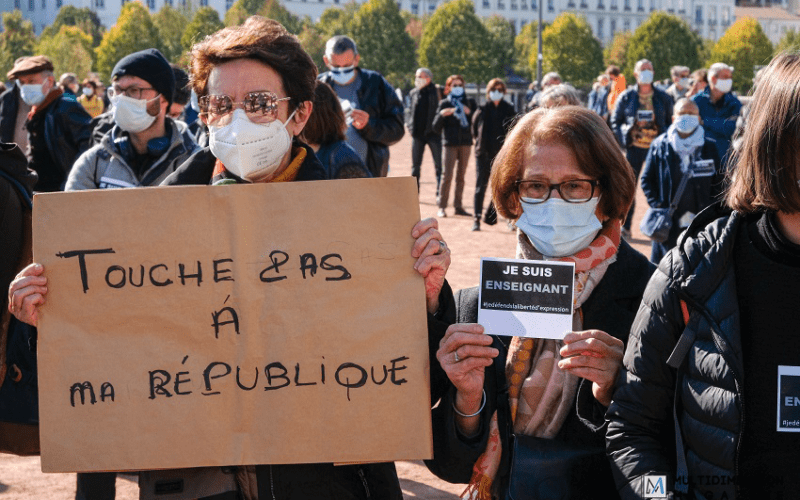Compiled by : Rabbani Khan
Photo : Shutterstock.com
On 16 February 2021, the National Assembly, the lower house of the French Parliament, adopted the controversial anti-separatism bill by 347 votes in favour, 151 against and 65 abstaining, thus facilitating the way for it to be passed into law in coming months. The text was presented to the Council of Ministers on 9 December 2020 by Gérald Darmanin, the Home Minister, and by Marlène Schiappa, Minister Delegate to the Home Minister in charge of Citizenship, exactly 115 years after the law on the separation of churches and state came into force. The date was chosen deliberately as the government wants to cement what secularism represents. The adoption of the bill came to no surprise as the National Assembly is dominated by ‘La République En Marche (LERM)’ party founded by the current French President Emmanuel Macron.
This bill aims to combat the idea of separatism and to focus on citizen engagement. It intends to provide answers to the community prone to the spread of radical Islam, by reinforcing the respect of republican principals, and by modifying certains laws on the practice of religious cults.
Macron, during his speech in Les Mureaux (Yvelines) on October 2, 2020, unveiled the main lines of this project:
The construction of a progressive and liberal “Islam of the Enlightenment”,
Strengthening secularism and reinforcing republican values
Enforce the obligations of neutrality for parapublic bodies on the one hand, and for concessionary bodies, delegated bodies and public service providers on the other hand.
Reinforce the control on associations, signing of civil engagement contracts
Strengthening the law on the principle of secularism adopted in 1905
The initial draft of the law provoked a multitude of reactions from political leaders belonging to different schools of thought, but also from religious leaders and associations. On the one hand, the great importance is given to this bill by the executive, and on the other hand, certain amendments presented by the government appear so obvious that questions about the existence of the bill are being raised. It has also divided even the ranks of the majority.
It is therefore interesting to ask the following question: is the bill on separatism an absolute necessity or is it merely a political diversion on the part of the government?
A necessity for law and order, according to the government
It is undoubtedly one of the most important bills of Emmanuel Macron’s five-year term. A little more than two months after the Mureaux speech that laid the groundwork for it, “Confirming Republican Principles” bill is renamed as “Anti-separatism Bill”.
The legislative part of a global strategy against separatism put in place since 2017, which had notably started in fifteen popular neighbourhoods before being extended over the whole territory with the creation, a year ago, to fight against Islamism and decline of the community, this bill brings new tools. It aims to reinforce secularism in public services and associations (which will have to commit themselves to respecting the values of the Republic when they receive subsidies), the reorganisation of religious associations as well as the fight against polygamy or forced marriages.
The texts have been strengthened following terrorist attacks by radical islamists groups active in French territory. Since the Mureaux speech, France has been affected by three such attacks: one in front of the former premises of “Charlie Hebdo”, the assassination of Samuel Paty and then at the Basilica of Nice.
Among the more than 70 separate articles, the law provides the state with the power to close places of worship and religious schools, as well as to ban preachers it considers “extremist”.
As the foreign funding of mosques has become an issue of growing concern, the religious groups now have to declare the source of large foreign donations and have their accounts certified by the state agencies.
Taking into account of Samuel Paty case, the school teacher who was beheaded in front of his school for having discussion with his students on liberty of expression by showing some of Charlie Hebdo’s caricatures on Islam and the Prophet Mohammad, who was allegedly denounced to the assailant by the father of one of the students of Samuel, the article 18 the bill has made the act of disseminating private or family information reasulting in endangering the lives of others an offence punishable of 5 years imprisonment and a fine of 75,000 euros when the victim is a public official.
Divergence of opinion among religious cult leaders
Reactions from religious cult leaders in France are divided. For Mohammed Moussaoui, president of the French Council of the Muslim Faith, “there will be more rigour in the management of associations, it will be more restrictive but in the end it will be beneficial and there will be less suspicion towards donations”, but according to François Clavairoly, president of the Protestant Federation of France, “this project will indeed have collateral damage on other faiths, particularly Protestants”. Haïm Korsia, chief rabbi of France, thinks that it is “a text which reminds us of the importance of carrying the values of the Republic everywhere, in all spaces, including religious spaces”, and which will give “legal tools to do what we could not do before”. The spokesman of the French Bishops’ Conference, Hugues de Woillemont, “understands the State’s desire to combat Islamism and radicalism”, but questions the provisions on non-contractual and homeschooling, as parents’ motivations for not putting their children in school may only be pedagogical, and not religious.
A political diversion: according to opponents
Jean-Luc Mélenchon of ‘La France Insoumise’ (France unsubmissive) party declared the bill “useless” and “harmful”, which stigmatises a particular religion. He positioned himself in defense of Muslims, whom he considers attacked by the text and for whom he is willing to act as spokesman.
Jean-Luc Mélenchon vigorously defended the vision of secularism, which “is not a state atheism”. According to him : “The 1905 law is a law of liberty, and with this bill it risks being transformed into a law of control, policing and repression.”
On the other hand, the President of the far-right “Rassemblement National” (The National Rally) party, Marine Le Pen feels “disappointed” by this text. She denounced the government’s intention for attacking all religions, whereas it is not a religious problem and that Islamism is a problem of ideology.
The opposition believes that the bill will serve as a tool of political diversion on the part of Macron’s government, such as to hide a very poorly managed coronavirus pandemic crisis and growing number of incidents of police violence witnessed since the beginning of the Yellow Vest Movement in November 2018. The political opponents also have remarked it as a strategy of Emmanuel Macron aimed at the next presidential elections in 2022. This bill will certainly encourage a section of the far-right-wing voters to side with him fragalising the base of Marine Le Pen to ensure his hold on power.
Answering yes or no to the approach of the bill is very difficult as opinions are divided. Critics argue that the law could harm civil rights, especially those of around 6-million-strong Muslim community. On the other hand, associations fear that their activities will be subjected to greater administrative restrictions.
Sources :
Wikipedia
The World
Les Echos
Le Parisien
Le Figaro
About the author : Rabbani Khan
Town Councillor at Stains Town Hall
Law student, University of Paris 2 Panthéon-Assas
Founder & Director : French with Rabbani – OFIORA




